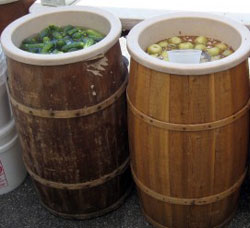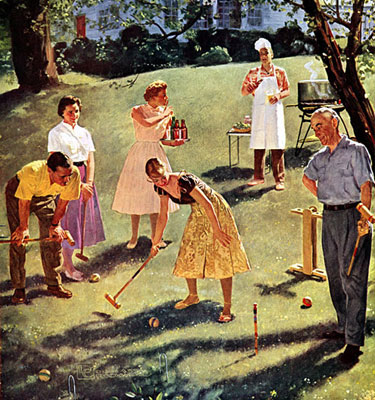 When I was a child, for two weeks every summer, my family would go to a small town in Norway called Fevik. We would stay in a hotel called the Strand Hotel, which is, now, a home for the elderly. We were a large family, four children, (I was the youngest), my mother, my Norwegian father, and his sister, Else.
When I was a child, for two weeks every summer, my family would go to a small town in Norway called Fevik. We would stay in a hotel called the Strand Hotel, which is, now, a home for the elderly. We were a large family, four children, (I was the youngest), my mother, my Norwegian father, and his sister, Else.
Our days were filled with expeditions that usually involved catching our lunch, by crabbing or trolling for mackerel which we would cook over a fire on a nearby island that was deserted, but for moss and heather.
I never understood why we couldn't stay at the hotel for lunch, like the other families. The explanation was always the same, it was too expensive and there were too many of us, something that I now fully understand.
Food, Family and Memory
Food, Family, and Memory
Pickle Memories
 Everyone in America has a childhood pickle memory, some great memories of the perfect pickle and some less notable. When my sister and I were kids there was a small pickle company located a couple of towns away and all the local grocery stores in the area had a 55 gallon wooden pickle barrel of their pickles with tongs and plastic bags for you to help yourself. On the side of the barrel was a sign that offered a free pickle to children under 7 years old, a brilliant marketing campaign to capture the next generation of customers. Well, they had me as a loyal customer after only one pickle!
Everyone in America has a childhood pickle memory, some great memories of the perfect pickle and some less notable. When my sister and I were kids there was a small pickle company located a couple of towns away and all the local grocery stores in the area had a 55 gallon wooden pickle barrel of their pickles with tongs and plastic bags for you to help yourself. On the side of the barrel was a sign that offered a free pickle to children under 7 years old, a brilliant marketing campaign to capture the next generation of customers. Well, they had me as a loyal customer after only one pickle!
These pickles were really a sour mustard pickle, a rather harsh sensation for a delicate young mouth. I trained myself to enjoy the intense sour flavor by eating slowly, but not waiting too long in between small bites so my mouth wouldn't burn. The company name was the Hescock Pickle Company. It was located on a bucolic bend in the Kennebec River with 3 large outside cement pools where the pickles cured. All the farmers within a 50 mile radius raised white spine pickling cucumbers for this company to help raise enough money to pay their real estate taxes.
Capirotada
 Growing up there were just some things
that this little pudgy boy would not eat. High on the short list of
food items, along with sour cream and avocados, was this recipe called
Capirotada. No matter how hard they tried I just wouldn’t move past the
strange blend of ingredients that went into this Mexican bread pudding.
Growing up there were just some things
that this little pudgy boy would not eat. High on the short list of
food items, along with sour cream and avocados, was this recipe called
Capirotada. No matter how hard they tried I just wouldn’t move past the
strange blend of ingredients that went into this Mexican bread pudding.
Now it’s the only thing I want to eat.
Capirotada is a Mexican bread pudding that’s normally served during Lent. Because of this it has always featured any ingredients that were on hand and someone on the humble side of desserts — a tad bit plain and not too sweet. And like most recipes coming from a country as diverse as Mexico, it’s also infinitely adaptable. It’s hard to find the same recipe for Capirotada when you begin to look around and speak with Mexican cooks.
Growing Up With The Help
 The Help surprised some people that Southern whites could
treat their servants with so much inhumanity in the 1960's. I was
shocked by a few specific incidents, but not surprised. I saw it close
up as a child. Not in Jackson, Miss., where the story is set, but in my
hometown of Beverly Hills where the help was almost exclusively
'negro,' before the Black Power Movement and the influx of Hispanic
housekeepers and nannies in the late 70's and early 80's.
The Help surprised some people that Southern whites could
treat their servants with so much inhumanity in the 1960's. I was
shocked by a few specific incidents, but not surprised. I saw it close
up as a child. Not in Jackson, Miss., where the story is set, but in my
hometown of Beverly Hills where the help was almost exclusively
'negro,' before the Black Power Movement and the influx of Hispanic
housekeepers and nannies in the late 70's and early 80's.
My overly emotional reaction to the film puzzled me. Good story, great performances, but floods of tears? On the drive home, memory hit and re-opened an old wound that I had hidden away. Of course... ESMUS HEMPHILL, our black maid in the 50's & 60's who was let go when I left for college and who I never thanked enough for all she did or properly protected her against my mother's unconscious cruelty towards her.
My mother, born into working class Memphis in 1925, became politically liberal, but personally she still carried a few racist seeds in her DNA. She would sit at the head of our dining table in Beverly Hills and ring a sterling silver bell to signal to Esmus that it was time to serve.
Bagels and Larry King
 Larry King is my spirit animal. When my brother and I were at El Rodeo Middle School and Beverly Hills High School, respectively, we would often ditch our morning classes and go instead for lox and bagels at Nate & Al’s. If we saw Larry King, we knew it would be a good day. Don’t tell my Mom we ditched, although I’m sure deep down she would have approved. Nate & Al’s was a Concord jet to New York in the middle of Beverly Drive. In fact, I once threw a party in New York and my mother insisted on ordering the hot dogs all the way from Nate & Al’s.
Larry King is my spirit animal. When my brother and I were at El Rodeo Middle School and Beverly Hills High School, respectively, we would often ditch our morning classes and go instead for lox and bagels at Nate & Al’s. If we saw Larry King, we knew it would be a good day. Don’t tell my Mom we ditched, although I’m sure deep down she would have approved. Nate & Al’s was a Concord jet to New York in the middle of Beverly Drive. In fact, I once threw a party in New York and my mother insisted on ordering the hot dogs all the way from Nate & Al’s.
Besides the point, but there was a large fiasco that involved my Mother and both her sisters concerning the foot-long hot dogs that arrived with the lack of foot-long hot dog buns. My Aunt who was hosting the party had a nightmare that the end of the hot dog sticking out of the too short buns would cause ketchup, mustard and the like to spill all over her flawless living room. It was fun without responsibility, and not the kind of party she wanted to be having, so she called their eldest sister to get involved and solve the problem. “I’ll take care of this,” my one Aunt assured the other, and sure enough, the next day a box from Nate & Al’s arrived at my Aunt’s door. But inside were 100 foot-long hot dogs and packs and packs of standard size hot dog buns. So now we had 200 foot-long hot dogs and zero useful hot dog buns, for a party for 35 people. My Mom promptly called Juniors, who referred us to their bakery, and the next day a guy showed up at my aunt’s door with 200 foot long hot dog buns delivered straight from Brooklyn. He didn’t even charge us, which I don’t understand, although if you knew my family stranger things have happened than a guy in coveralls delivering 200 foot long hot buns from Brooklyn on a Saturday for free.
More Articles ...
Welcome to the new One for the Table ...
Our Home Page will be different each time you arrive.
We're sure you'll find something to pique your interest...


